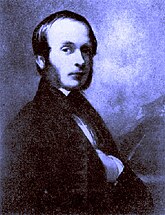John Snow

| Poetry of reality Science |
| We must know. We will know. |
| A view from the shoulders of giants. |
John Snow (15 March 1813–16 June 1858) was an English physician, anesthesiologist, and early public health specialist best known for identifying the water-borne nature of cholera. Though derided at the time, his controversial views were ultimately vindicated in one of the most famous cases in modern epidemiology. His theory played a crucial role in modernizing municipal water sanitation.[1][2] Snow was also an early practitioner of anesthesiology, helping forward its use in medicine. He spent much of his life a vegetarian, eventually embracing veganism, always drank water he had boiled, and was also a teetotaler. Due to a renal disease he acquired later in life, he began to incorporate some animal and alcoholic products into his diet, believing his veganism may have been the cause of his sickness.[3][4] He died at the relatively young age of 45 from a stroke.
1854 Cholera Outbreak
John Snow had been working as a professional doctor, delivering babies using anesthetics during the 1854 cholera outbreak that was occurring in Broad Street London. Interested in its possible causes Snow began to investigate, tracking down victims of the disease. Time and time again, he was led back to the same communal water pump on Broadwick Street. Those killed or afflicted by cholera always seemed to get their water from that same well. Snow interviewed a number of people in the area who didn't get cholera, as it turned out they all had alternative sources of water available that they consumed.[5] Snow concluded that water was the conduit by which cholera spread and that the water from the specific pump on Broadwick Street must be contaminated. Despite his careful use of deduction and the scientific method, some of Snow's theories were rejected by city officials. The pump was shut down for a time but city officials refused to believe that the sewage system was in need of repair and denied the possibility of needing improved sanitation. Over time, in part due to investigative journalism, the necessary precautions were taken to fix the town's water and sewage systems.[6][7]
Germ Theory of Disease
This was all just prior to the germ theory of disease taking off. Earlier theories like miasma![]() (noxious or poison air) were still more popular. Others simply felt that God himself was behind the outbreak. Snow rejected these theories and maintained that poor sanitation was the cause of the cholera outbreak and that it was indeed a result of drinking contaminated water.[8]
(noxious or poison air) were still more popular. Others simply felt that God himself was behind the outbreak. Snow rejected these theories and maintained that poor sanitation was the cause of the cholera outbreak and that it was indeed a result of drinking contaminated water.[8]
Anesthesiology
In addition to his pioneering work as an epidemiologist, Snow was also an earlier practitioner of anesthetics.[9] Ever since 1847 when obstetrician James Young Simpson had first recommended doctors administer anesthetics during childbirth few had actually listened. It wasn't until John Snow had helped popularize the uses of anesthetics that it would become more common with the London medical establishment. He collected an enormous amount of personnel research from his own practice detailing his experimentation and use of it.[10]
Gallery
External link
References
- ↑ "John Snow | British physician". Encyclopedia Britannica. Retrieved 2020-01-14.
- ↑ "The John Snow Archive and Research Companion". johnsnow.matrix.msu.edu. Retrieved 2020-01-14.
- ↑ Snow, Stephanie J. (2004) "Snow, John (1813–1858)" in Oxford Dictionary of Biography.
- ↑ https://www.ph.ucla.edu/epi/snow/box1cricketarticle.htm
- ↑ "John Snow and the Broad Street Pump: On the Trail of an Epidemic". www.ph.ucla.edu. Retrieved 14 January 2020.
- ↑ ibid.
- ↑ Koch, T., & Denike, K. (2009). Crediting his critics' concerns: Remaking John Snow's map of Broad Street cholera, 1854. Social science & medicine, 69(8), 1246-1251.
- ↑ Snow's Testimony
- ↑ Ramsay, M. A. (2006, January). John Snow, MD: anesthetist to the Queen of England and pioneer epidemiologist. In Baylor university medical center proceedings (Vol. 19, No. 1, pp. 24-28). Taylor & Francis.
- ↑ Caton, Donald (2000-01-01). "John Snow's Practice of Obstetric Anesthesia". Anesthesiology: The Journal of the American Society of Anesthesiologists. 92 (1): 247–247. ISSN 0003-3022.




